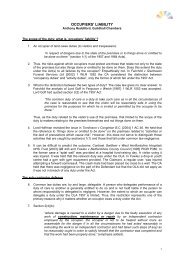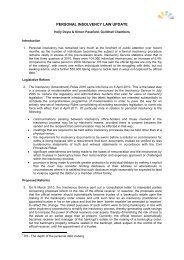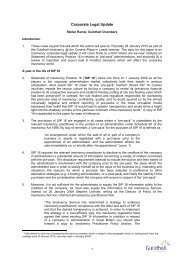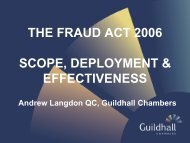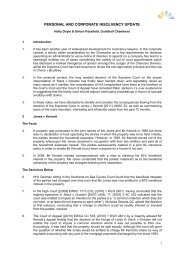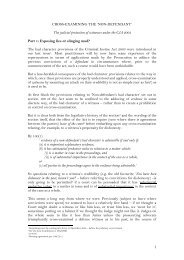Personal and Corporate Update - Holly Doyle & Simon Passfield
Personal and Corporate Update - Holly Doyle & Simon Passfield
Personal and Corporate Update - Holly Doyle & Simon Passfield
Create successful ePaper yourself
Turn your PDF publications into a flip-book with our unique Google optimized e-Paper software.
(3) DJ Lambert failed to find the Appellants’ circumstances ‘exceptional’ in the sense that itwas disproportionate to order a sale;(4) Insofar as DJ Lambert purported to apply the proportionality principle, she failed to do sobecause:(i)(ii)she wrongly concluded that applying the principle would mean that the Trusteewould never be able to realise the interest in a bankrupt’s home; <strong>and</strong>she failed to balance the serious harm caused to the Appellants by the making ofthe order against a slight potential gain to the creditors.86. Peter Smith J considered that these grounds of appeal were based on a misunderst<strong>and</strong>ing of theDistrict Judge’s judgment; she firstly considered the facts of the case on the basis that theproportionality test did not require Article 8 to be read into s 335A <strong>and</strong> then reconsidered all thefacts as if it did. On both bases, it was concluded that the interests of the creditors should prevail.On the facts of the case there were no grounds for interfering with that conclusion.87. Though not strictly necessary to do so, the learned Judge went on to express a view on theapplication of Article 8 ECHR <strong>and</strong> the jurisprudence in relation thereto to s 335A IA.88. Firstly, he noted that the decision of the Supreme Court in Manchester City Council v Pinnock[2010] UKSC 45 (in which it was held that on the application of a local housing authority for apossession order against the secure tenant of a dwelling house of which it was the l<strong>and</strong>lordpursuant to s 143D of the Housing Act 1996, the court had to have the power to assess theproportionality of making the order <strong>and</strong> determine any issues of fact relevant for the purpose ofthat exercise) did not apply to possession proceedings brought by a private l<strong>and</strong>owner, asexpressly stated in the judgment of Lord Neuberger.89. Secondly, he considered the decision of the European Court of Human Rights in Zehentner vAustria (app no 2008/02 16 July 2009) in which an order had been made evicting the Applicantfrom her home following a judicial sale carried out after the making of the Austrian equivalent of acharging order. The judicial sale of the applicant’s apartment was authorised on the basis of apayment order which had been issued in summary proceedings. At the date of the sale, theApplicant lacked legal capacity. Section 187 of the Enforcement Act provided that only personswho had been present at the judicial sale or had erroneously not been summoned had a right toappeal within 14 days from the date of the auction. In contrast to the views expressed by legalwriters, it was the Supreme Court's established case-law that this time-limit was absolute <strong>and</strong>,therefore, also binding in a case like the present one where the debtor had not been capable ofparticipating in the proceedings <strong>and</strong> had not been represented.90. On the facts, it was held that there had been a violation of Article 8 because there was a lack ofprocedural safeguards. The Austrian government’s arguments that the time-limit served toprotect the bona fide purchaser <strong>and</strong> the general interests of an efficient administration of justice<strong>and</strong> of preserving legal certainty were deemed insufficient to outweigh the consideration that theApplicant, who lacked legal capacity, was dispossessed of her home without being able toparticipate effectively in the proceedings <strong>and</strong> without having any possibility to have theproportionality of the measure determined by the courts.91. Peter Smith J concluded that Zehentner could be distinguished from the position under Englishlaw because the circumstances of that case were extremely unusual. Section 335A (2) <strong>and</strong> (3)provide a necessary balance between the rights of creditors <strong>and</strong> the respect for privacy <strong>and</strong> thehome of the debtor which serves the legitimate aim of protecting the rights <strong>and</strong> freedoms of theothers. Accordingly, the provisions satisfied the test under Art 8(2) of being necessary in ademocratic society <strong>and</strong> are proportionate.92. Finally, the Judge considered the application of s 89 of the Housing Act 1980, which provides asfollows:




